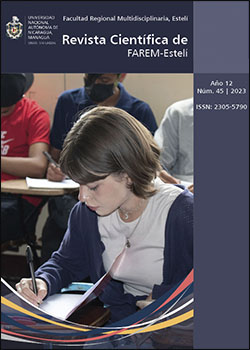To determine the sustainability index of the drinking water system in the Paso Ancho community. Esteli, Nicaragua
DOI:
https://doi.org/10.5377/farem.v12i45.16046Keywords:
Water system, sustainability, managementAbstract
The purpose of this research was to determine the sustainability of the drinking water system in the Paso Ancho community in the municipality of Estelí. The method used is observational, according to its philosophical approach it is quantitative, cross-sectional and descriptive. The methodology used was PROPILAS (Water and Sanitation Pilot Project), whose purpose is to validate and systematize proposals under the concept of sustainability, evaluating the management factors for the operation and maintenance of rural drinking water systems, in order to determine the sustainability of the systems. A score of 3.2 was obtained for the system status factor, which is in the range of 2.51-3.50 and is therefore considered to be in a regular or moderately sustainable state. The evaluation of administrative management yielded a score of 2.23, which is in the range of 1.51-2.50, meaning that it is in poor condition and is not sustainable (serious deterioration process). The administration does not have a schedule of meetings, does not have files or records of system modifications, and does not provide training on how to use the system. The score obtained for the system’s operation and maintenance factor was 1.83, which indicates that it is located in the range 1.51-2.50, meaning that it is in a bad state and is not sustainable (serious deterioration process). It is concluded that the sustainability index of the entire drinking water system, according to the sustainability factors, is qualified as a moderately sustainable system or in a regular state. The water consumed in this community from the physical-chemical point of view is of good quality and therefore suitable for human consumption.
Downloads
References
Castillo, I. (2013). Evaluación físico-química y bacteriológica del agua en el sistema de abastecimiento del casco urbano del Municipio de La Concordia durante cinco semanas de abril y junio del año 2013. Tesis de grado, La Concordia. Recuperado el 15 de Mayo de 2022, de https://repositorio.unan.edu.ni/5475/1/64547.pdf
Delgado, C., & Falcòn, J. (2019). Evaluación del abastecimiento de agua potable para gestionar adecuadamente la demanda poblacional utilizando la metodología SIRAS 2010 en la ciudad de Chongotape, Chiclayo. Lima. Lima: USMP. Recuperado el 13 de Junio de 2021, de https://repositorio.usmp.edu.pe/handle/20.500.12727/5195
Duràn, J., & Torres, A. (2006). Los problemas del abastecimiento de agua potable en una ciudad media. Espiral, XII(36), 129-162. Recuperado el 18 de Agosto de 2021, de https://www.redalyc.org/pdf/138/13803605.pdf
Gonzales, C. (2021). Diagnostico y determinaciòn del ìndice de sostenibilidad mediante la propuesta de mejora al mètodo PROPILAS, del sistema de agua potable en el centro poblado Choquepata, distrito de Oropesa -Cusco. Tesis de grado, Cusco. Recuperado el 18 de Agosto de 2022, de https://repositorio.uandina.edu.pe/bitstream/handle/20.500.12557/4764/Cesar_Tesis_bachiller_2021.pdf?sequence=1&isAllowed=y
Neira, M. (2006). Dureza en aguas de consumo humano y uso industrial, Impactos y medidas de mitigaciòn. Tesis de grado, Santiago de Chile. Recuperado el 26 de Agosto de 2021, de https://repositorio.uchile.cl/tesis/uchile/2006/neira_m/sources/neira_m.pdf
Organización Panamericana de la Salud. (2007). ¿Cómo reducir el impacto de los desastres en los sistemas de agua y saneamiento rural? (Primera ed.). Quito, Ecuador. Recuperado el 23 de Agosto de 2021, de https://catalogosiidca.csuca.org/Record/UDELAS.012459
Soto, A. (2014). Sostenibilidad de los sistemas de agua potable en el centro de Nuevo Perú, Distrito La Encañada - Cajamarca 2014. Cajamarca: UNCFIEAPI. Recuperado el 12 de Junio de 2021, de https://repositorio.unc.edu.pe/bitstream/handle/20.500.14074/677/T%20628.162%20S718%202014.pdf?sequence=1&isAllowed=y
Published
Issue
Section
License
Copyright (c) 2023 Revista Científica de FAREM-Esteli

This work is licensed under a Creative Commons Attribution-NonCommercial-ShareAlike 4.0 International License.



